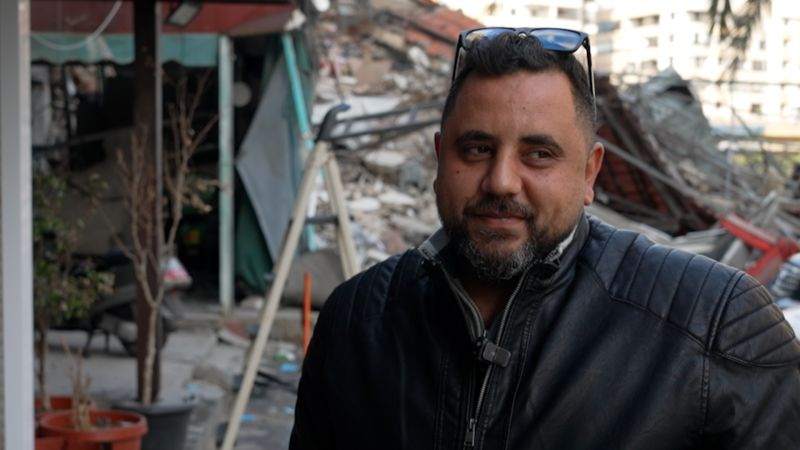Like tens of thousands of Lebanon’s displaced, Hussein Mallah headed to the southern suburbs of Beirut at the break of dawn on Wednesday.
The truce between Hezbollah and Israel had just begun, ending a two-month war. Mallah says he took to repairing his home and businesses “almost immediately.”
“My 24/7 bakery is going to be open for business tonight,” said Mallah on Friday, his chest widening and his voice bursting with triumph. Behind him, five employees, decked out in the bakery’s red and white uniform, were refitting the countertops at the storefront.
It was the third day of an increasingly uneasy ceasefire. The Israeli military had just issued an order demanding that Lebanese inhabitants of the country’s southern-most villages refrain from returning to their homes.
The nascent agreement is in its most fragile state. In the 60-day aftermath of the deal, Israel will withdraw its forces as the Lebanese army ramps up its presence in south Lebanon to ensure that the area is free of Hezbollah’s arms. But a complete absence of trust between the two sides – officially enemy states – means that the phased unfolding of the deal could fall apart at any moment, with both sides already accusing the other of violating the ceasefire agreement.
There have been a number of reports of Israeli forces on the Lebanese side of the border firing at people and villages, while Israel claims it has observed Hezbollah regrouping.
“I’m optimistic,” said Mallah, counting his prayer beads with one hand. “Even if the ceasefire collapses, we’ll just do the whole thing all over again. I was raised this way and I’ll always be this way. Nothing can break our spirits.”
Traffic jams have returned to Hadi Nasrallah Avenue in Lebanon’s capital, the southern suburbs’ main boulevard named after the son of late Hezbollah leader Hassan Nasrallah. It cuts through the dense urban area where barely any building has been spared the damage wrought by two months of Israel’s near nightly airstrikes here.
This is Hezbollah’s seat of power where around one million people live, most of whom heeded Israel’s evacuation orders.
Shards of glass crack underfoot and rubble falls from above as people sweep away the damage from their flats, lobbing detritus off balconies. A gathering crops up around a pickup truck loaded with speakers blaring Hezbollah anthems. A handful of people carry posters of Nasrallah, who was killed in a massive Israeli airstrike just over two months ago, and who has not yet had a public funeral.
The mood is somber, but defiant. Hezbollah’s leaders appear to hope for a repeat of 2006 when the fiery Nasrallah addressed large crowds with rousing speeches, and when a ceasefire with a formidable Israeli military was accepted by Hezbollah supporters as a “divine victory.”
On Friday, Nasrallah’s successor – Secretary-General Naim Qassem – used similar language. “We are victorious because we prevented the enemy from destroying Hezbollah,” said Qassem, the elderly cleric who was Nasrallah’s long-time deputy, but lacks his predecessor’s charisma and fiery oration. “This is a victory because the resistance persisted and continues to persist.”
There are several parallels between the two all-out wars that raged between Hezbollah and Israel. The same agreement that ended the 2006 war was used by Lebanese officials to bring about a ceasefire more than two decades later. As in 2006, Israel’s current leaders vowed, but failed, to destroy Hezbollah. And the current rush of displaced people returning to their damaged and destroyed towns and neighborhoods is a mirror image of those emotional scenes from the aftermath of the previous war.
But the differences are also stark. Israel has decimated Hezbollah’s top military brass and Nasrallah’s absence is acutely felt. Hezbollah has also made some major concessions, reneging on a promise to only cease its rocket fire on Israel’s northern-most territory after Israel ended its ongoing, devastating offensive in Gaza. It has also agreed to a rigorous enforcement of the 2006 agreement, which stipulated that Hezbollah’s forces retreat to around 40 kilometers (25 miles) from the Israel-Lebanon frontier.
And trouble is brewing at home. Inside Lebanon, there is a widely held belief that Hezbollah has emerged from this war as a shell of its former self, which may cause long-festering domestic tensions to flare.
Still, Hezbollah’s robust support base console themselves by reminding themselves that things could always have been worse, and that they were spared the fate of the Palestinians in Gaza. They also argue that the militant group, complete with its ballistic and medium-range missiles, remains one of the best-armed non-state actors in the world.
“The war was longer than we’d hoped it would be, but in the end we were victorious and that’s all that matters,” said 25-year-old Marwa from her badly damaged home in the southern suburbs of Beirut. She said that she stepped into her home after two months of displacement not knowing how extensive the damage would be.
“I couldn’t even tell you how difficult it was to see my home covered in broken glass, to see my memories ripped apart,” she said, her eyes welling up with tears. “We’ve been working nonstop, just so we can be able to have a coffee at home.”
“When we first got home, we were shocked… Barely anything was left untouched,” she said, her eyes welling up with tears. “I hoped to be able come back home after all that time. And then I found that I couldn’t stay… But it’s ok. It’s all material stuff. It can all be replaced.”
Others are less lucky. Umm Hussein, 41, stayed put as she watched throngs of returnees on the television screen. Unlike most of the displaced, she had already seen photographs of her home in the south of Beirut. An Israeli airstrike had destroyed it.
“Throughout this war, I was patient with my displacement,” said Umm Hussein on the day the ceasefire went into effect. “But today, I watch these scenes and I feel like a prisoner.”

